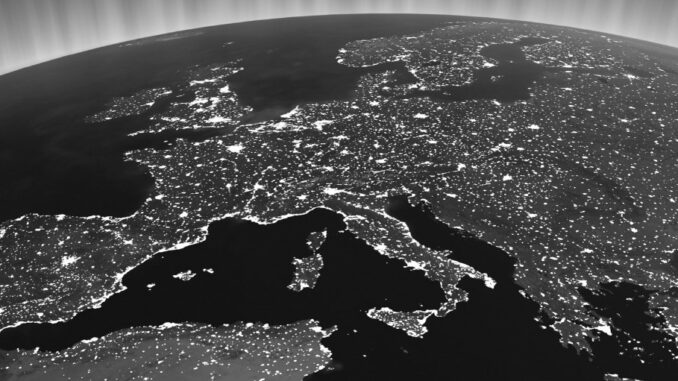By David Thunder, THE CONSERVATIVE WOMAN 12 April 2024
 Earth maps courtesy of NASA: http://visibleearth.nasa.gov/
Earth maps courtesy of NASA: http://visibleearth.nasa.gov/
THE past few years of electoral results across Europe have confirmed, without a shadow of a doubt, that Europe is swinging right, from Hungary, Italy and Greece to Germany, the Netherlands, Switzerland, Sweden and Finland. (See note at end.) The tendency is not completely uniform – for example, Spain’s strongly nationalist and conservative Vox party did poorly, Poland’s conservative party lost its absolute majority, and no alternative right party has yet taken off in Ireland – but it is dominant enough to reshape the European political landscape as a whole.
It is now widely accepted that this June’s European elections will shift the balance of power rightward in the European Parliament. Just how far-reaching the shift will be, of course, is yet to be seen. However, the rightward swing in public sentiment is almost universal across Europe, so the momentum is by now unstoppable.
Leftist journalists wring their hands and wonder why ‘far right’ elements are on the march in Europe, but their obsession with the boogey man of the ‘far right’ blinds them to an evident fact, namely that the ideological centre of gravity of Europe’s traditional parties has shifted to the left, leaving traditional right-wing voters homeless.
The Old Right in Europe has swung left, embracing distinctively leftist and woke policies such as hate speech legislation, intrusive climate regulations, and lax immigration rules. So those who are voting for so-called ‘alt right’ and ‘far right’ parties are often just attempting to reclaim political ground that has been abandoned by the Old Right.
Policies now associated by mainstream commentators with the ‘far right’ are, in reality, policies that were, for the most part, standard fare on the right a few decades ago. Such policies include defending national sovereignty, celebrating national culture and ethos, opting for free market solutions to social problems over State-imposed solutions, exercising fiscal restraint, defending law and order, clamping down on illegal immigration and welfare fraud, and promoting socially conservative values like traditional marriage, biological markers for gender identity, and parental choice in education.
Of course, the details vary from country to country, and the ‘right’ has never been ideologically uniform. Nonetheless, this is a fair sketch of the general ideological tenor of the traditional political right in Europe. There is no doubt that this ‘right’ is currently making a comeback, with impressive electoral gains for so-called ‘far right’ parties that now occupy the ideological ground the Old Right occupied a few decades ago.
The practical consequences of this comeback will depend on whether parties on the right can agree among themselves, and also whether or not advocates of change, even in a leading party, command an absolute majority in parliament. For example, the Netherlands’ recently elected Freedom Party (PVV), led by Geert Wilders, whose election platform included calls for the prohibition of mosques, the end of refugee intake, and a Nexit referendum, has been forced to tone down its pre-election commitments in order to win sufficient support in Parliament to form a government.
Consequently, we cannot assume that the policies of New Right parties in Europe will necessarily correspond neatly to their election manifestos. It would be more accurate to say that the increasing electoral success of so-called ‘far right’ parties across Europe is proof that the political culture of Europe is more open to traditional right-wing aspirations and values than it was before, and that this will inevitably reshape the legislative and policy agendas of European governments to varying degrees on a range of issues, from carbon taxes to immigration policy.
It is not ‘far right’ leaders who are responsible for Europe’s swing to the right, but the Old Right, who enthusiastically embraced leftist policies on immigration, environmental policy, hate speech laws and transgender ideology, opening up a glaring political vacuum on the right. It was only a matter of time before that vacuum was filled by parties like Sweden Democrats, Rassemblement National, and Alternativ fur Deutschland (AfD).
Note:
- Hungary – 3/4/2022: Victor Orban’s nationalist, socially conservative, and anti-immigration ‘Alliance for Hungarian Solidarity’, a coalition of two right-wing parties, comfortably reasserted its absolute majority in Hungary’s 2022 parliamentary elections.
- Sweden – 11/9/2022: Sweden’s anti-immigration, nationalist, socially conservative and Euro-sceptical ‘Sweden Democrats’ party, defying public expectations, increased its number of seats from 61 to 73 in the 2022 elections, becoming the second largest party in the State, proving that immigration and national identity had become a defining issue for many Swedish voters.
- Italy – 25/9/2022: Giorgia Meloni defied pundits by becoming the first female Prime Minister of Italy on a conservative pro-natality, pro-life, anti-LGBT, controlled-immigration platform, leading by far the largest political party (Fratelli d’Italia) after Italy’s 2022 parliamentary elections.
- Finland – 2/4/2023: Finns Party, a socially conservative, Euro-sceptical, ‘get tough on immigration’ party, became the second largest party in Finland on April 2 2023, winning it a part in the new governing coalition.
- Greece – 25/6/2023: Greece’s centre-right New Democracy party was re-elected with an absolute majority. Its migration minister promised to continue a ‘strict but fair‘ migration policy.
- Germany – 8/10/2023: AfD (Alternative für Deutschland), a socially conservative anti-immigration party in Germany, had 20 per cent voter support nationwide in a July 2023 opinion poll, projecting it to be the second strongest political force in the country. Though we should not assume that opinion polls will be reflected in elections, the consolidation and ‘mainstreaming’ of AfD in Germany has been confirmed in recent elections in Bavaria and Hesse (October 8 23), where their share of the vote grew considerably.
- Switzerland – 22/10/2023: The Swiss People’s Party, a Euro-sceptical, ‘get tough on immigration’ party, came in as the largest party in the National Council (equivalent to lower house of parliament) after federal elections on October 22 2023, 62 seats ahead of its nearest rival (Social Democrats), which won 41 seats.
- Netherlands – 22/11/2023: PVV (Freedom Party), led by right-wing populist Geert Wilders, who called for the prohibition of Islamic mosques, closing borders to refugees, scrapping environmental targets, and a vote to exit the EU, became by far the largest party in the Netherlands with 37 seats, coming well ahead of its nearest rival, GreenLeft Coalition, which won 25 seats.
This article appeared on The Freedom Blog on March 29, 2024, and is republished by kind permission.




Socialists out in Spain after
recognizing “Palestine”. Gov’t won’t consulate to Ramallah after Katz refuses to authorize provision of services to PA residents.
https://www.jewishpress.com/news/global/europe/spains-population-punishes-hamas-supporting-leadership/2024/06/10/
But antisemitism is alive and well in Europe!!! Thank U!